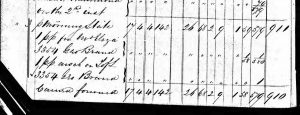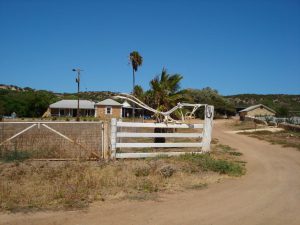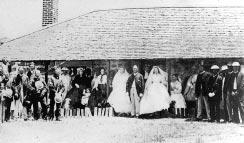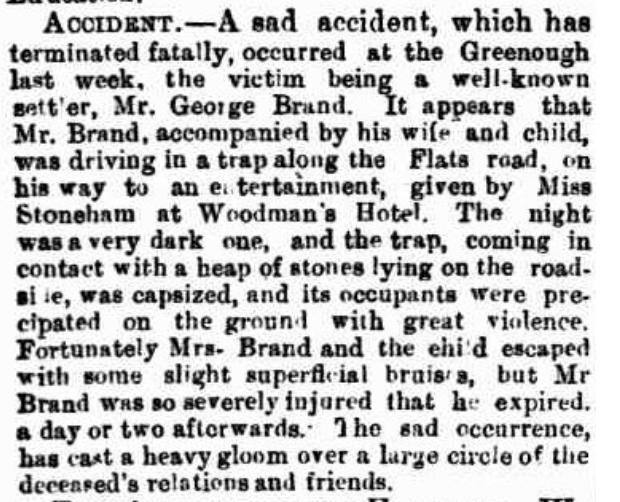1
November
George Brand: A Convict Success Story – Part 5
Freedom or Something Like It
On 3 April 1856 George received his Ticket of Leave, after only 11 months in the Swan Settlement, and he went to work for Charles Crowther in the Greenough area.1,2,3,4 The below register shows the money that came to George on his release to start the next stage of his life as a ticket of leave man.4



Do you have a convict ancestor? Click on the below image to start searching for your convict ancestors at Findmypast today.
Bibliography
Image Credit: 'Ironbarks', Greenough, Western Australia. https://www.panoramio.com/photo/19112398. Accessed 15 June 2016.
Image Credit: 1867 Isabella Brand's Wedding at 'Ironbarks'. https://mv.ancestrylibrary.com/viewer/d6d7fd4b-8c41-4714-83d7-f2758cf874f5/54394119/13802447848? _phsrc=gqo97&usePUBJs=true. Accessed 10 June 2016.
- 1. Erickson, Rica. The Brand on his Coat: Biographies of some Western Australian Convicts. Nedlands: University of Western Australia Press, 1983
- 2. Fremantleprison.com.au. ‘Convict Database’. https://fremantleprison.com.au/history-heritage/history/convict-database/. Accessed 16 May 2016.
- 3. Ancestry.com. Western Australia, Australia, Convict Records, 18461930 [database on-line]. Provo, UT, USA: Ancestry.com Operations, Inc., 2015. Original Data: Convict Records. State Records Office of Western Australia, Perth, Western Australia, Australia. Convict Department, Registers: Reference Number: ACC 1156/R18. Accessed 16 May 2016.
- 4. Ancestry.com. Western Australia, Australia, Convict Records, 18461930 [database on-line]. Provo, UT, USA: Ancestry.com Operations, Inc., 2015. Original Data: Convict Records. State Records Office of Western Australia, Perth, Western Australia, Australia. Convict Establishment, Receipts and Discharges: Reference Number: ACC 1156/R&D1-R&D2. Accessed 16 May 2016
- 5. Fremantleprison.com.au. ‘History: The Convict Era’. https://fremantleprison.com.au/history-heritage/history/the-convict-era/. Accessed 10 June 2016.
- 6. Ancestry.com. Western Australia, Australia, Convict Records, 18461930 [database on-line]. Provo, UT, USA: Ancestry.com Operations, Inc., 2015. Original Data: Convict Records. State Records Office of Western Australia, Perth, Western Australia, Australia. Reel Number: 8309, Reference Number: ACC 115. Accessed 16 May 2016.
- 7. Ancestry.com. Western Australia, Australia, Crew and Passenger Lists, 1852-1930 [database on-line]. Provo, UT, USA: Ancestry.com Operations, Inc., 2010. Source Citation: SRO of Western Australia; Albany Passenger list of Assisted Emigrants showing names of emigrants and from which countries selected; Accession: 115; Roll: 214. Accessed 5 June 2016.
- 8. BDM.dotag.wa.gov.au. ‘Searching Western Australian Online Indexes’. http://www.bdm.dotag.wa.gov.au/_apps/pioneersindex/default.aspx. Registration: Number: 6111, Victoria District, 1861. Accessed 10 June 2016.
- 9. Geraldton.wa.hospitalityinns.com.au. ‘Ironbarks Old Forge’. https://www.geraldton.wa.hospitalityinns.com.au/ironbarks. Accessed 12 June 2016.
- 10. Adb.anu.ed.au. ‘Sir David Brand’. https://adb.anu.edu.au/biography/brand-sir-david-9571 (link is external). Accessed 10 June 2016.
- 11. Trove. ‘Herald’. (1879, September 21). Fremantle, Western Australia (Fremantle, WA: 1867 – 1886), p.3. https://nla.gov.au/nla.news-article114441153. Accessed 31 May 2016.
- 12. BDM.dotag.wa.gov.au. ‘Searching Western Australian Online Indexes’. http://www.bdm.dotag.wa.gov.au/_apps/pioneersindex/default.aspx. Registration: Number: 6325, 1872. Accessed 10 June 2016.

Hi Megan, I loved reading your story about the Brand family. I also know the Brand family…George-John-Forrest-Robin-Janice. I know the Janice Brand and her family. I would love to get a printed copy of this wonderful story to give as a Christmas present. Not sure if you have any printed. Happy to collect.
I love a good redemption story, and it’s so great that he was able to achieve good standing and respect of his community and the convict thing was distant history. Sad that he died at 52. I’m always so stunned when I hear life stories where so much happens, and the person dies so young. I wonder wha’s more dangerous, the horse buggy or the automobile?
Hi Penelope
It is such a great story of the human spirit especially given the way Australian convicts were treated in many instances. He was of good behaviour so was quickly released upon arrival in Australia and chose to grab this opportunity with both hands. It is a credit to him and his family that the forged ahead in such a harsh climate and made a real go of it. The legacy they have left behind in their descendants stands as a testament to that. It is sad he died so young, especially given the hard work he did to change his life. It is hard to say which is more dangerous, although I would probably say horse as they are an animal and can be unpredictable. A car is the responsibility of the person driving it. However, I think an automobile does much more damage! Thanks again for reading.
Regards,
Megan
In some ways, these past convicts had an easier time than today’s felons. At least in the US, they are stripped of their right to vote and basically no one will hire them for a job. I wish there were more second chances in our culture, especially after reading such an impressive redemption story.
Hi Penelope
You are right, it is clear from this story, that some people can be rehabilitated if given the right opportunity. I believe that there should be more support of ex-prisoners to help them assimilate back into society. If more was spent on rehabilitation than on punishment, maybe the crime rate would reduce.
Regards,
Megan
What a fascinating life your great great grandfather had. His family would have to be his best accomplishment and legacy.
It’s wonderful that you have been able to research and trace his life story and learn so much detail about him and your ancestors.
I greatly enjoyed reading your series and learned a lot not only about George but about the lives of the convicts who contributed to the development of the colonies. Thankfully Governor Philip recognized the need to put the education and skills of convicts to good use.
I knew about Sir David Brand but did not make the connection that George Brand was his great grandfather until you mentioned it. By discovering this you now know that your family is also part of political history…lol.
Thank you for sharing your family history with us. It is a great read.
~Jude
Hi Jude
I am so glad you enjoyed the story of George Brand. It was amazing how he turned his life around from a criminal transported from his homeland forever, into a respected member of his community in his new country. I am glad that you enjoyed the other information about the convict system that George became a part of. You are so right that the government did learn to use the convict’s skills to build the country.
I always knew about Sir David Brand being part of the family as mum grew up visiting “Uncle Dave” and his family. However, it took a while for me to discover the convict connection as my grandmother was from an era where it was a shame to have a convict in the family. I have instead embraced my convict past and am so proud of what George and his family achieved.
I hope to share more with you on my website in coming months. Please come back and join me.
Regards,
Megan
Wow what a colorful history Mr Brand had. I read that this was your great great great grandfather? This story is very cool and to know that this is where you came from (or part or the story anyway), awesome. I have tried to dig into my own family background but information is limited. My family seemed to be nomads way back when. Maybe I am a gypsy. I wish I was able to find information about my family in the same detail that you have with regards to George Brand. Very cool.
Hi Jason
I am so lucky that there is a wealth of information about George because he was a convict and the records the government kept on them was quite intricate. I am sure there would be a way to trace your history as there are so many records around. It would be cool to be a gypsy! Thank you for reading and feel free to ask me questions at any time.
Regards,
Megan